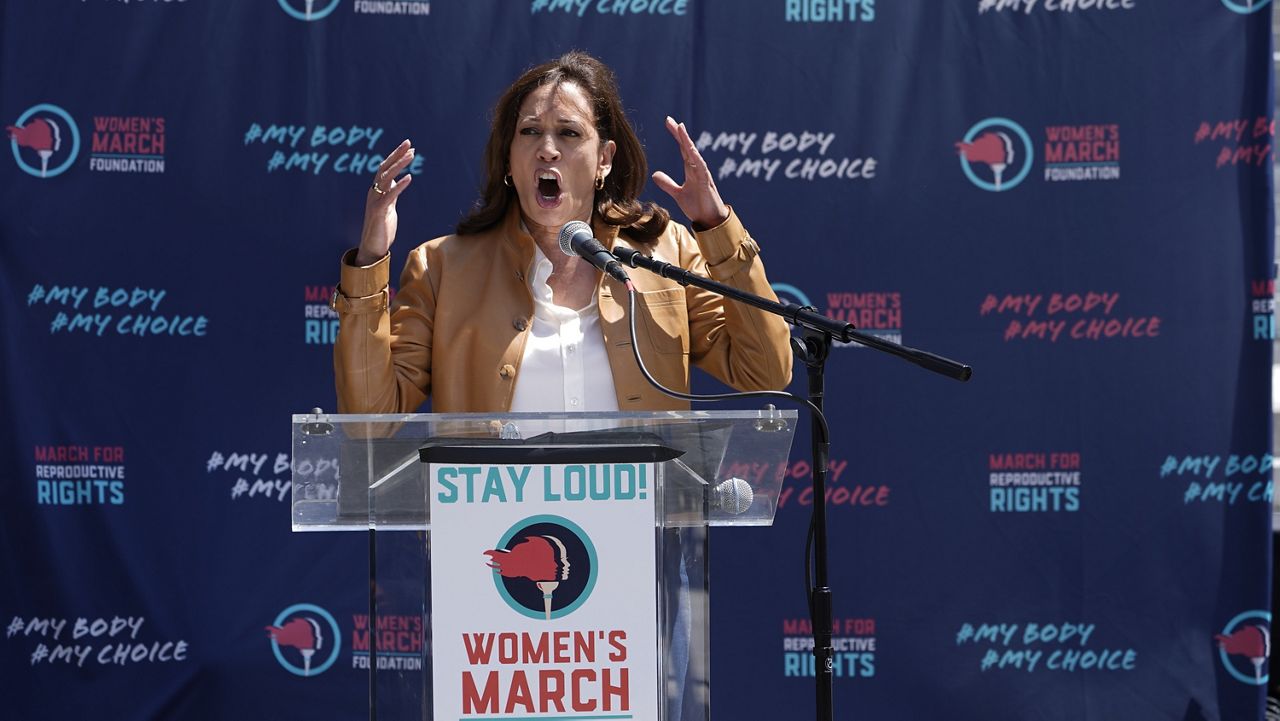Vice President Kamala Harris, a leading White House voice on reproductive rights, traveled to Iowa on Friday for a discussion on abortion rights two weeks after the state’s governor signed off on a bill that restricts the procedure after six weeks.
“One does not have to abandon their faith or deeply held beliefs to agree the government should not be telling her what to do,” Harris said to loud cheers from the crowd at Drake University in Des Moines.
The comments were part of a moderated discussion with Jennifer Palmieri, who worked in the White House under former President Barack Obama and on former Secretary of State Hillary Clinton’s 2016 campaign.
The vice president continued her push to encourage states to extend postpartum coverage through Medicaid from two months to 12 months. She noted only three states offered postpartum coverage that long when the administration started the effort and now 35 have signed on.
“Expand Medicaid coverage for postpartum care from two months to 12 months. Put your money where your mouth is,” Harris said on Friday.
Exactly two weeks before the vice president's visit to the Hawkeye state, Iowa’s Republican Gov. Kim Reynolds signed a bill banning most abortions after early cardiac activity can be detected in a fetus. That is often as early as six weeks into a pregnancy.
“Most women will not even know they're pregnant in six weeks. So it is an effective outright ban,” Harris argued on Thursday regarding the new law.
“As I travel the country, it has become clear to me that so many people in these state legislatures don’t even know how women’s bodies work,” she added.
Reynolds had called a special session of Iowa’s General Assembly for, according to a press release from her office, “the sole purpose of enacting legislation that addresses abortion and protects unborn lives.”
“Today, the most glaring injustice of all is about to be put right,” Reynolds said just ahead of signing the bill. “Everyone understands that a heartbeat signifies life and we understand that when it falls silent, something precious has been lost.”
A judge temporarily blocked the bill while a court challenge is being worked out.
With the move, Iowa joined a sizable – and expanding – list of states restricting or banning abortions following the Supreme Court’s ruling Dobbs v. Jackson Women's Health Organization just over a year ago.
The decision overturned Roe v. Wade – a nearly 50-year-old ruling that established a constitutional right to an abortion before viability – and instead returned the abortion issue to individual states.
Since then, Harris has emerged as one of – if not the – most vocal public figures on reproductive rights in the Biden administration, traveling the country to talk about the issue and delivering a major speech last month to mark the one year anniversary of the decision.
An NBC News poll in late June found 61% of respondents disapproved of the Supreme Court’s decision to overturn Roe v. Wade. The Biden administration and Democrats are hoping it will be a galvanizing issue for voters in the 2024 election.
Just ahead of the decision’s anniversary, President Joe Biden and Harris celebrated endorsements from three major reproductive rights groups during a rally.
Many banking on the issue sticking with voters are looking to Ohio this fall, when voters will decide whether the right to an abortion should be added to the state constitution.
Harris on Friday argued the wave of new restrictions and bans are a part of an “agenda that has been a long time in the making,” tying it to GOP-led efforts on voting rights and education.
Last week, Harris delivered remarks in Florida, offering sharp criticism of the state’s Board of Education approving a revised Black history curriculum to satisfy legislation signed by Gov. Ron DeSantis.
Harris’ stop in Iowa comes on the same day nearly every major GOP presidential candidate is set to attend the state’s annual Lincoln Dinner Friday night.
For Republican presidential contenders, Iowa is still a crucial early primary state. The Democratic Party, on the other hand, voted to change its lineup, knocking Iowa out of the top spot.



